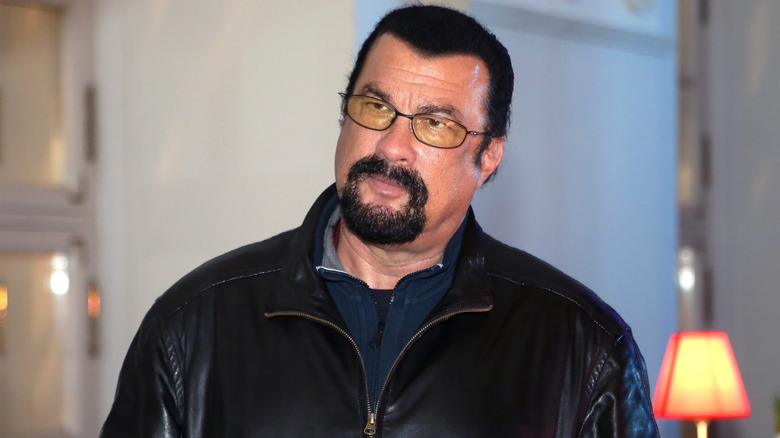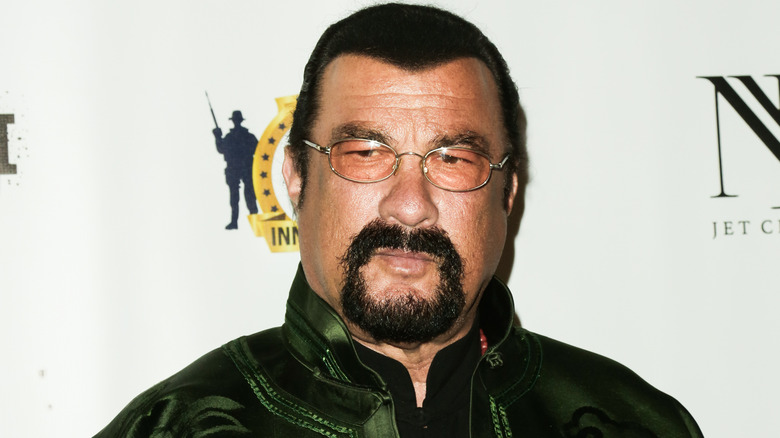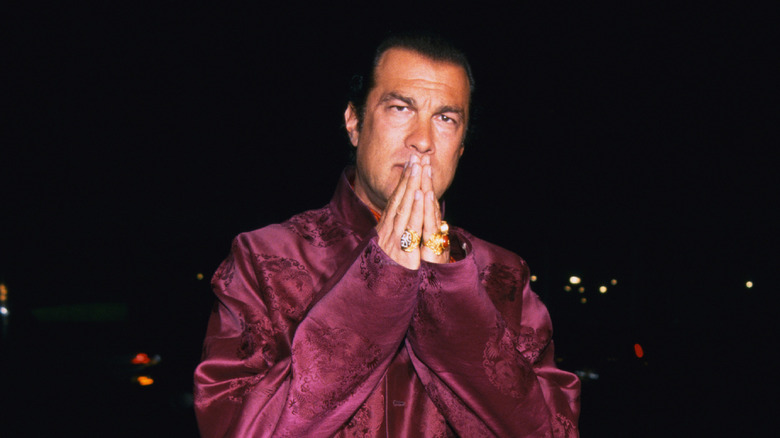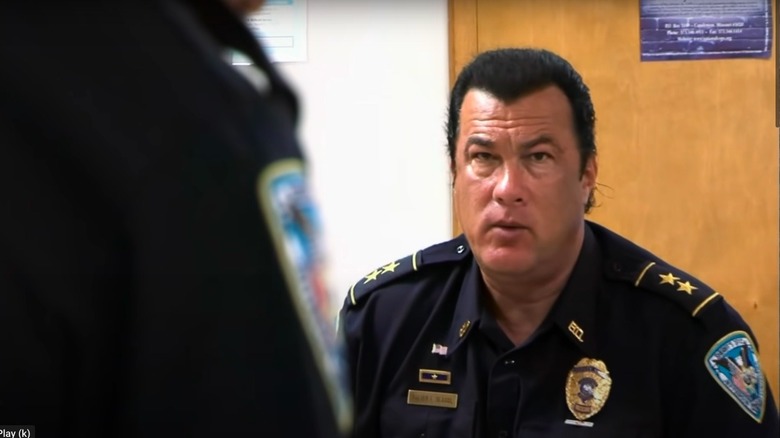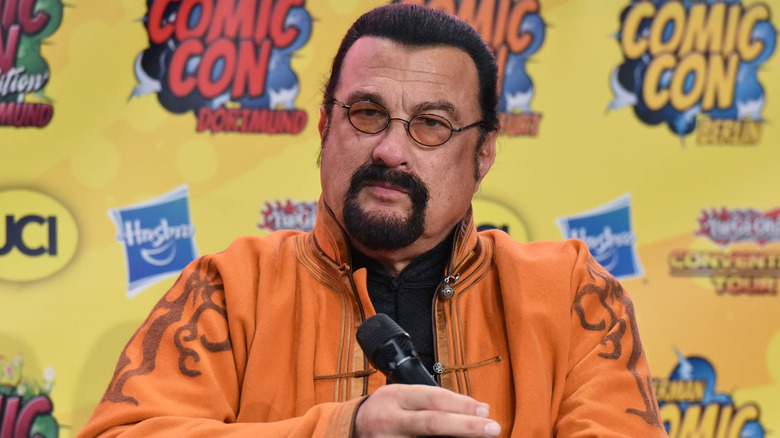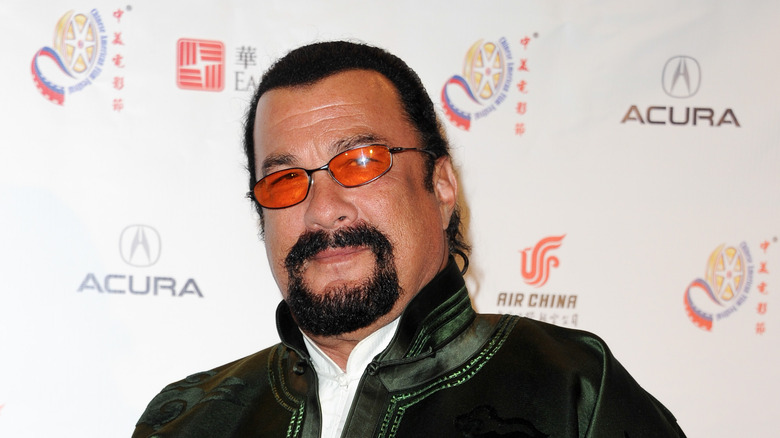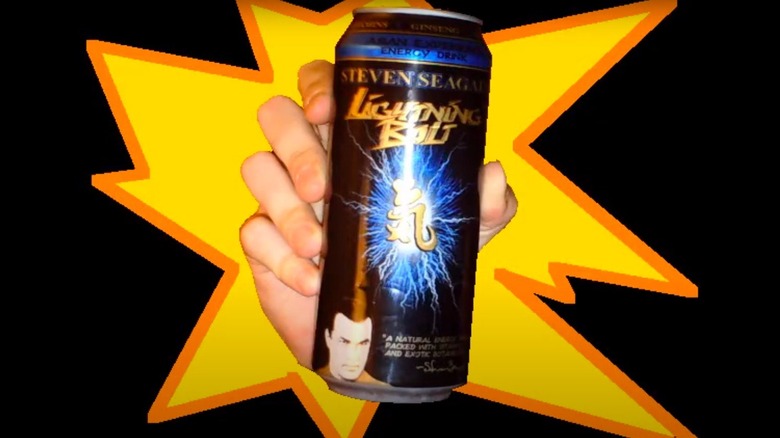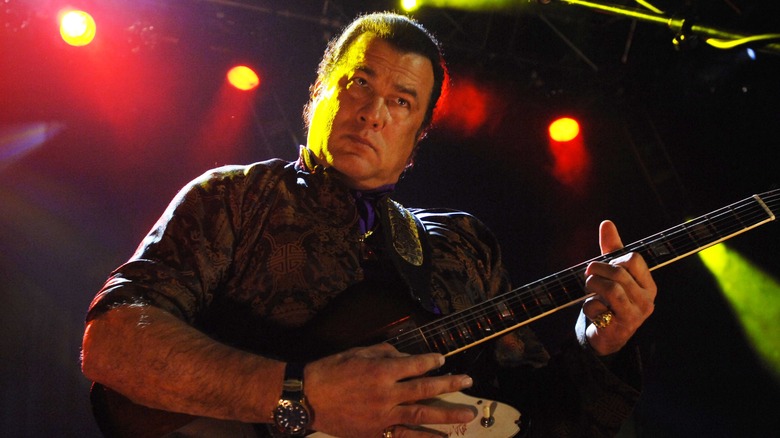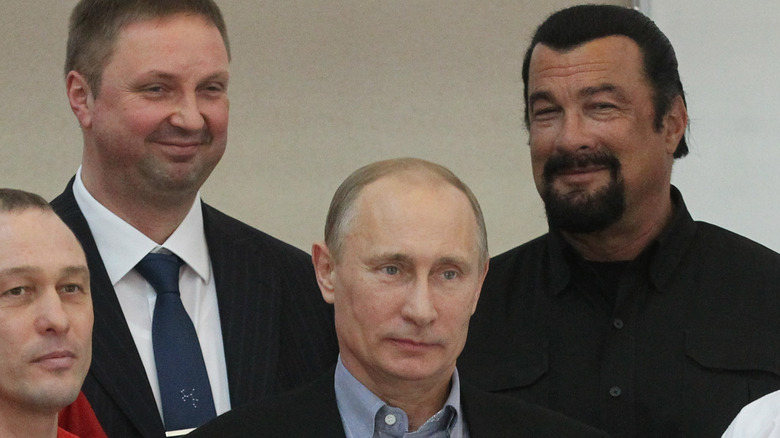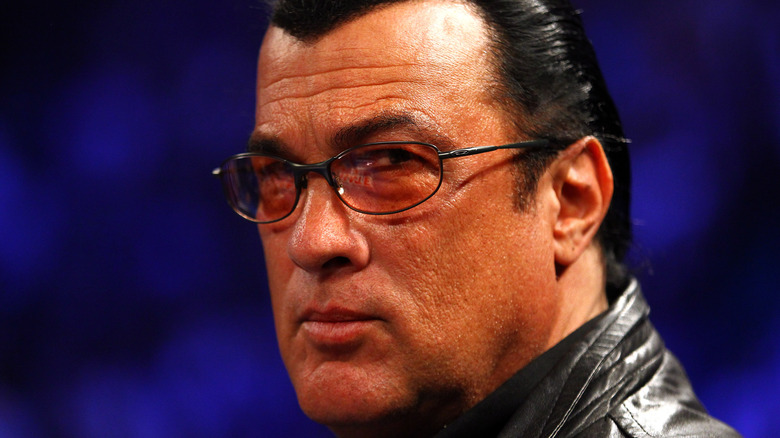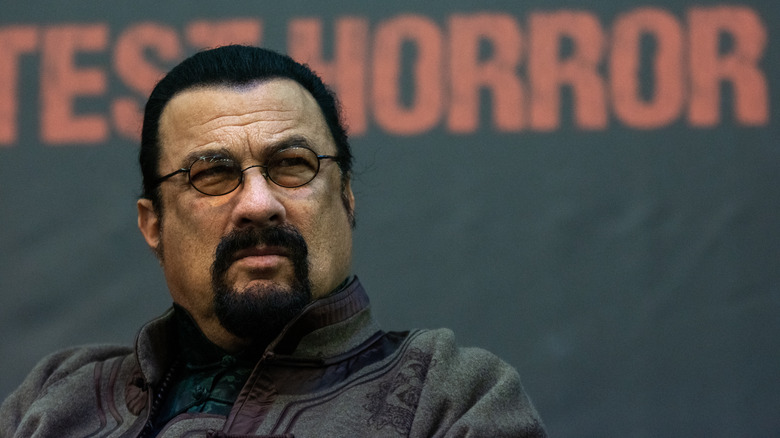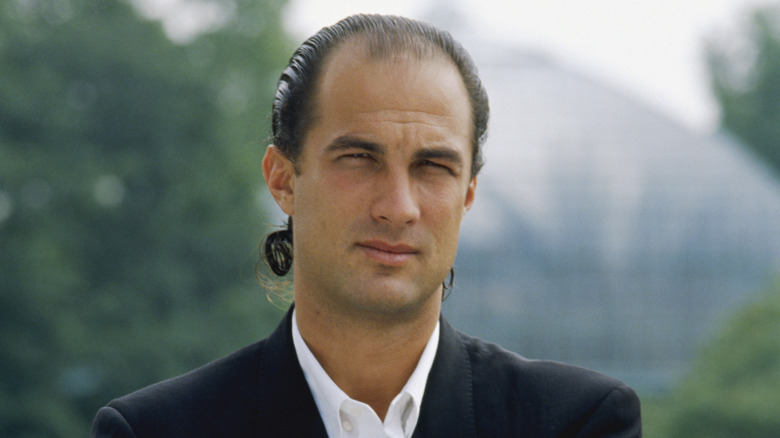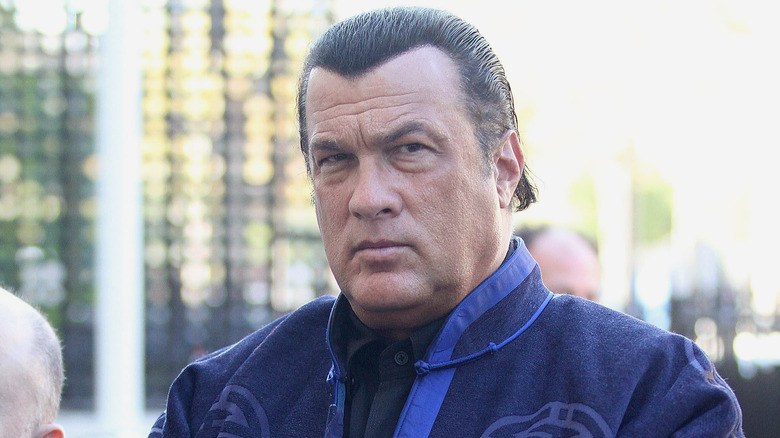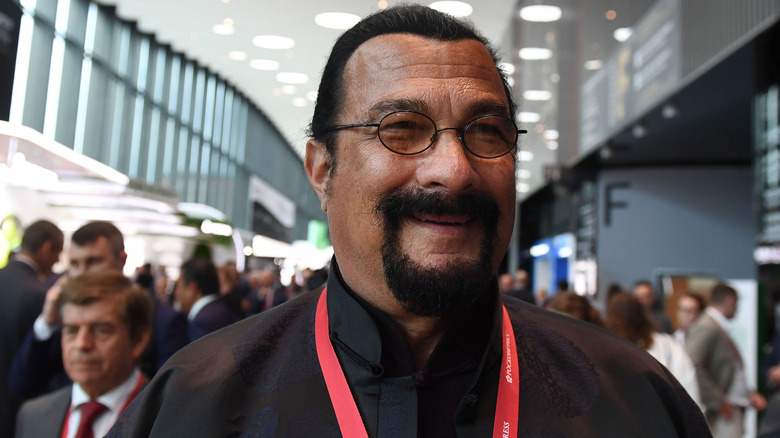The Reasons You Don't Hear Much From Steven Seagal Anymore
We may receive a commission on purchases made from links.
Steven Seagal's journey to the silver screen was far from typical. Unlike most movie stars, Seagal had no acting experience when he was cast in the leading role in the 1988 feature film "Above the Law," having been a martial arts instructor (and, he claimed, ex-CIA operative) whose clients included some Hollywood movers and shakers who felt he had what it took to be a star.
They were right. The movie was a hit, and more big-screen outings followed. Within a few years, Seagal had established himself alongside the likes of Arnold Schwarzenegger and Sylvester Stallone as one of Hollywood's most bankable action stars with such films as "Hard to Kill," "Marked for Death," and, of course, his biggest hit, 1992's "Under Siege," in which he played a Navy cook (and former Navy SEAL) who singlehandedly prevents a group of terrorists from absconding with a cache of nuclear weapons from a battleship.
For Seagal, that film also represented the zenith of his Hollywood success. In the decades that followed, Seagal's career continually slid downwards, marked by controversy, allegations of heinous behavior toward women, his tight friendship with the world's most nefarious despot, and even criminal charges involving a shady cryptocurrency scam. Those are just some of the highlights — or lowlights, perhaps? — to be reviewed when reading on for a look at the reasons you don't hear much from Steven Seagal anymore.
His movie career floundered, but he kept churning them out
It's hardly a secret that Steven Seagal's movie career peaked in the 1990s, with his career decline beginning when Warner Bros. opted not to renew his contract after signing him to a four-picture deal. Since then, Seagal has starred in dozens of movies — primarily of the straight-to-video variety, and few of which anyone's ever heard of.
Need proof? "Half Past Dead," "Out for a Kill," "Mercenary for Justice," and "Force of Execution" are just a few of the many action flicks he's pumped out, with the most recent — "Beyond the Law" — arriving in 2019. In addition to these films' generic titles, they're also notable for their low scores on Rotten Tomatoes, mostly well below 50 percent — with more than a few zeroes in the mix.
Interestingly, Seagal had an opportunity to return to the big leagues in Sylvester Stallone's "The Expendables" franchise, with Stallone himself confirming discussions were underway when he tweeted, "Just talked to Steven S. in Moscow ... he wants to be in EX3, if the part fits ..." Seagal never did appear in the film, telling The Big Issue, "I just didn't like some of the people involved." While he didn't name names, one of the producers of the "Expendables" movies is Avi Lerner — who sued Seagal for $14 million in 2005, alleging he delayed production on two movies due to chronic tardiness, his insistence on rewriting scenes, and permitting his entourage to interfere with filming.
He rebranded himself as a reincarnated Tibetan Buddhist master
At some point in the late 1990s, Steven Seagal became heavily involved with Tibetan Buddhism. Seagal was no garden-variety Hollywood dilettante; in fact, he was granted the title "tulku" (designating him as a reincarnated lama who'd been a spiritual master in a past life) by Penor Rinpoche, who was then the Supreme Head of the Nyingma School of Tibetan Buddhism. Seagal's elevation to the upper echelons of spiritual enlightenment, however, led to speculation that the title came in exchange for a presumably hefty donation. Penor Rinpoche's rep claimed ignorance, telling SFGate that he didn't know a thing about any such arrangement.
However, Seagal's status as a reincarnated master raised the suspicions of Ganen Thurman, director of special projects at Tibet House in New York (and, by the way, brother of Uma Thurman). "I haven't looked into this, but I'm curious as to under what condition or terms he was accorded this status," Thurman told GQ in 2012. "I'm afraid it troubles me."
Meanwhile, in that same GQ feature, Seagal — who was leading a three-day seminar on Tibetan Buddhism (costing $700 per person) — implied that Buddhism was the reason why his movie career had stalled. "The studios know exactly what they want. Fighting," he said. "As I became a lama, I had to establish a line I could not cross, and I've taken two years off as a result."
His reality show was tainted by some sordid allegations
At a certain point in the early 2010s, Steven Seagal shifted focus from Tibetan Buddhism to law enforcement. This was apparent in 2009, with the arrival of "Steven Seagal: Lawman," an A&E reality show that followed Seagal as he pursued a sideline he'd apparently kept secret for the previous two decades: fighting crime in Louisiana as a deputy with the Jefferson County Police Department.
The show was initially a hit, giving A&E its highest premiere ratings ever. However, the show was dogged with controversy when Kayden Nguyen filed a $1 million sexual harassment lawsuit against Seagal, alleging she was hired as his personal assistant but that her actual job description was Seagal's "sex toy." While the case was eventually dismissed, Seagal resigned from the force, and production on the show was halted.
As it happened, Seagal was also a sheriff's deputy in Arizona's Maricopa County, where he worked under controversial Sheriff Joe Arpaio; the second season of "Lawman" moved from Louisiana to Arizona. That season generated another lawsuit when Seagal led a team of officers to bust a guy who allegedly raised fighting roosters — by smashing through the wall of his house with a tank, killing a puppy in the process. That suit was also dismissed — followed by A&E dismissing "Steven Seagal: Lawman" from its schedule after the second season. The show limped on for a third and final season when it was picked up by the obscure ReelzChannel.
His TV cop show didn't last
After acquiring that third season of Steven Seagal's reality show, ReelzChannel began developing a drama series for him. That series, "True Justice," arrived in 2012, with Seagal playing Elijah Kane, who leads an elite unit of undercover cops in Seattle. The show became the fledgling channel's highest-rated series, drawing 1.2 million viewers, which was enough to warrant a second season.
According to Seagal, his goal for the show was characteristically lofty. "We tried to set up a situation where I could test the waters of television to see if I could make the most realistic TV show that's ever been made," he told Complex, conveniently ignoring the not-so-real fact that the Seattle-set show was filmed in Vancouver. Not only was Seagal the show's star, he also created it and wrote the scripts for every single one of the episodes. In fact, he insisted that the realism he was trying to achieve onscreen sprang not from his imagination but from his two decades worth of real-life experience fighting crime as a sort-of sheriff's deputy in various parts of the U.S. "It's not like I watched 'Serpico' one day and was like, 'I want to write a movie like that,'" he explained. "I write from experiences in my life."
The series' initial blush of success did not sustain for the long term. ReelzChannel canceled "True Justice" after its second season, sending Seagal careening back into the world of straight-to-video action flicks.
He's been accused of sexual misconduct — a lot
If there's one thread that seems to be interwoven throughout Steven Seagal's Hollywood career, it's accusations of sexual misconduct. In addition to the dismissed lawsuit from his former assistant, numerous women have come forward to share their uncomfortable experiences with Seagal, which have run the gamut from sexual harassment to full-on sexual assault.
That latter allegation came from Regina Simons, who claimed she was raped by Seagal while working as an extra on his 1994 film "On Deadly Ground." Dutch model Faviola Dadis also alleged that Seagal sexually assaulted her in 2002 during what was supposed to be an audition. Then there were the allegations of well-known actors Portia de Rossi — who tweeted that Seagal unzipped his pants and exposed himself to her during a meeting — and Julianna Margulies, who recalled Seagal putting the moves on her while she auditioned for him. "I was one of the lucky few who got out of there unscathed," she told CBC Radio's Q, explaining Seagal's MO was to prey on young female actors looking for their big break. Even Jenny McCarthy had a cringe-inducing story, recalling that Seagal demanded she strip naked when she auditioned for him in hopes of landing a role in "Under Siege 2."
When Seagal was unexpectedly asked about those allegations during a television interview with "BBC Newsnight," he did not proclaim his innocence; instead, he unhooked his earpiece and microphone, stood up, and wordlessly stormed off.
His energy drink didn't do well
Arguably one of Steven Seagal's strangest entrepreneurial enterprises was launched in 2005 when he decided to get into the beverage sector by unveiling his own energy drink. According to beverage industry trade magazine BevNET, Steven Seagal's Lightning Bolt was purportedly the first-ever energy drink to contain Tibetan goji berries and Asian cordyceps, available in various flavors including "Cherry Charge" and "Asian Experience." As Adweek noted, the product descriptions on the long-since-vanished website were as over the top as one would expect. "When Steven Seagal finished creating a drink that holds untold natural power, there was only one equivalent in nature — The Lightning Bolt," read one passage.
There was even a series of hilariously low-budget commercials involving a swimming pool that was purportedly full of the stuff. After a woman kisses him on the cheek after expressing her desire to take a dip in the energy drink — speaking to Seagal in Russian — he picks up a can and speaks to the camera. "It's good to be the king, isn't it?" Seagal declares. "And guess what? It's gonna happen to you — if you drink Lightning Bolt."
Much like Seagal's TV shows, Lightning Bolt did not last for long; the drink pulled a vanishing act, disappearing from store shelves. These days, in fact, cans of the drink are so rare that a single can is priced at a hefty $1,500 on eBay.
His music career hasn't exactly burned up the Billboard charts
In the mid-2000s, Steven Seagal unveiled his musical side with the release of his debut album, "Songs from the Crystal Cave," showcasing his love of guitar-based blues music. Believe it or not, he managed to land Stevie Wonder as a guest star, providing backing vocals and a smoking harmonica solo on the track "My God."
Seagal went back into the studio and emerged with his second LP, "Mojo Priest." As critic Thom Jurek wrote in his AllMusic review of the latter album, "All of this music takes itself so seriously that it borders on delusional excess." Describing Seagal's ability as a guitarist, he added, "It rarely rises above bar band pedigree, and most of the time, isn't that good." As has been the case with his movie career, bad reviews haven't stopped Seagal and his backing band, Thunderbox, from continuing to perform.
When it comes to guitars, it appears that Seagal's biggest conundrum is deciding which of them to play, given that he owns a whopping 300 or so. "I collect guitars because I'm a serious player, and I've been playing since I was a child," he solemnly intoned in a History Channel interview. Among Seagal's hundreds of guitars are axes that once belonged to such artists as Lenny Kravitz, Jimi Hendrix, and Stevie Ray Vaughn. In addition, he has four guitars — all signed — that were previously owned by blues legend B.B. King.
His bromance with Vladimir Putin has been curious
One of Steven Seagal's more puzzling relationships began when he and his blues band were brought to Moscow to perform for Russian president Vladimir Putin. The action star and the dictator became fast friends; in 2014, Seagal raised eyebrows when he described the notorious despot in glowing terms. "I'd like to think I know him well," Seagal told Russian state newspaper Rossiyskaya Gazeta, as reported by BuzzFeed News. "Well enough to say that he's one of the greatest world leaders alive today. I consider him my friend and I'd like to consider him my brother."
During that interview, Seagal also expressed his desire to become a full-fledged citizen of Russia. "But in no case do I intend to renounce my U.S. citizenship, because I love my country and believe in it," he clarified. "Although I have nothing against Russian citizenship. Perhaps someday this will happen."
It did when Putin granted Seagal Russian citizenship in 2016, presenting him with his passport personally. "I would like to congratulate you, and I also hope that this small step will mark the beginning of the gradual improvement in our interstate relations," Putin told his pal, as reported by The New York Times. According to Kremlin spokesman Dmitry Peskov, Seagal had lobbied long and hard for that Russian passport. "He had been really persistent for a long time and been asking to grant him citizenship," Peskov said of Seagal, as reported by Foreign Policy.
His role as a Russian diplomat hasn't exactly been a success
Steven Seagal's relationship with Russia grew even tighter in 2018 when he was named as Moscow's special envoy to the U.S. As The Hollywood Reporter pointed out, Russia's Foreign Ministry made the announcement via Facebook, revealing that Seagal's new role — for which he reportedly wasn't being paid — was to "facilitate relations between Russia and the United States in the humanitarian field, including cooperation in culture, arts, public and youth exchanges."
In that 2018 interview with "BBC Newsnight" (the one he walked out of when questioned about sexual assault allegations), Seagal attempted to portray his new diplomatic role as somehow being patriotically American. "I love America, I love Russia, and I am trying very hard to work in such a way where we can have more meaningful discussions and strive to make better and better relations," he stated.
After Russia invaded Ukraine in 2022, Seagal admitted that his envoy role would likely change to reflect the chill that the war had brought to Russian-American relations. "Relations between the United States and Russia, as you know, are very tense. And there are discussions about changing my position in terms of what I was previously assigned," Seagal told RIA Novosti in 2022. "There are discussions about how to change my position in terms of what I was previously appointed to."
Ukraine declared Steven Seagal to be a national security threat
Thanks to his tight relationship with Russian dictator Vladimir Putin, Steven Seagal isn't particularly popular in Ukraine. That came through loud and clear in 2017 when the recently minted Russian citizen was labeled a threat to national security by the government of Ukraine and banned from entering the country for five years.
The news site Apostrophe published a letter from the Secret Service of Ukraine (SBU) that explained the circumstances behind Seagal's ban. "The decision to ban entry into Ukraine is made if there is sufficient information, obtained in the manner prescribed by law, about the fact that he (the individual – ed.) has committed a socially dangerous act, regardless of the territory where it was committed, which is contrary to the interests of ensuring the security of Ukraine, warning, the identification, termination and disclosure of which falls within the competence of the SBU," the letter stated. The Guardian reported that the press secretary for SBU confirmed the letter was legitimate, and that Seagal was indeed barred from entering the country.
Not surprisingly, being persona non grata in Ukraine preceded Seagal receiving an award from Vladimir Putin; in 2023, Seagal was presented with Russia's Order of Friendship honor, bestowed upon those who have gone above and beyond in contributing to improving Russia's foreign relations.
The bonkers novel he wrote was not a bestseller
The same year that Steven Seagal was banned from Ukraine, he also published his first novel, co-written with Tom Morrissey, former chairman of the Arizona Republican Party. Titled "The Way of the Shadow Wolves: The Deep State and the Hijacking of America," the story follows protagonist John Nan Tan Gode, a Native American lawman who happens upon a massive conspiracy to bring hordes of Islamic terrorists into the country to bring down America from within.
And who's at the top of this conspiracy pyramid? Why, former U.S. president Barack Obama, of course, who's also in league with Mexican drug cartels — and the shadowy Deep State that secretly runs everything. Phoenix New Times shared the book's brief epilogue, which celebrated the end of the Obama administration and the arrival of Donald Trump. "The former POTUS was in full disaster mode, leading an effort to discredit and drive his successor from office," Seagal and Morrissey wrote. "Fully funded by a multi-billionaire outside the country, rioters were being recruited and paid for by this cabal and were waging war against the Constitution and the will of the American people." And, just for kicks, there's a foreword from a controversial Arizona sheriff and failed political candidate Joe Arpaio.
His attempts to make sequels to his hit movies went nowhere
As Hollywood continues to buckle under the weight of sequels and reboots of previously successful movies and TV shows, Steven Seagal has been eager to return to the project that started it all for him: 1988's "Above the Law," in which he played Chicago cop and martial arts expert Nico Toscani.
In 2016, actor-writer-producer Woodie Mister tweeted that he and Seagal were working on "Above the Law 2," with Seagal retweeting that message to confirm its veracity. "Very excited about this," wrote Seagal. "27 years in the making." Later that same year, Seagal had even more news to share: he and Mister were working on a script for a sequel to another one of his hits, "Under Siege 3." "It's time," Seagal tweeted. The latter film, in fact, is one that Seagal had been thinking about for some time, and he shared his idea when interviewed for The Big Issue in 2014. "I would set it in Russia," he declared, outlining a plot in which special forces operatives from both Russia and the U.S. work together to bring down terrorists. "I'm trying to do 'Under Siege 3,' which is the plot that I told you," he said. When asked if he saw the film happening, he replied, "Sure hope so."
As of late 2023, neither "Under Siege 3" nor "Above the Law 2" have been made — although the latter is listed by IMDb as being in pre-production.
He's earned a reputation for being hard to work with
During a showbiz career extending from the 1980s to the present, Steve Seagal has earned a reputation. Spoiler alert: it ain't a good one. In fact, stories about Seagal being difficult to work with abound, including his disastrous "Saturday Night Live" hosting stint in 1991, which went so horribly awry that he's generally regarded as the show's worst-ever host. "He just wasn't funny and he was very critical of the cast and writing staff," "SNL" alum Tim Meadows said in the oral history "Live From New York," describing the process of communicating comedic ideas to Seagal as being akin to speaking German to someone who doesn't speak German.
Meanwhile, some of Seagal's big-screen co-stars have gone public with their own personal horror stories of working with him. Actor Stephen Toblowsky, for example, recalled Seagal making ridiculous, on-the-fly script rewrites while shooting "The Glimmer Man." Meanwhile, John Leguizamo alleged a physical altercation with Seagal on the set of "Executive Decision." "And we start rehearsing and he came in and was like, [low, breathy voice] 'I'm in command. What I say is law.' So I started, like, [snorts]. I mean, who the f*** talks like that?" Leguizamo told The A.V. Club. "So I started laughing and he slammed me with an Aikido elbow against a brick wall and knocked all the air out of me. I dropped to the ground, and all I could say was, [gasping] 'Why? Why?'"
His dabbling in cryptocurrency resulted in federal charges and a hefty fine
In 2018, a press release announced that Steven Seagal had been named the brand ambassador of Bitcoiin2Gen, a company that mined and sold cryptocurrency. He then began promoting the company on his social media channels.
Just a few years later, that role came to bite him on the butt when an investigation by the U.S. Securities and Exchange Commission revealed Bitcoiin2Gen was a scam that cheated close to 500 investors out of an estimated $11 million. As MarketWatch pointed out, when Seagal was promoting the cryptocurrency, he neglected to mention that he had been paid $250,000 cash and an additional $750K in crypto to do so — a flagrant violation of SEC regulations.
Seagal was charged and ultimately agreed to pay $314,000 in a settlement. Seagal's spokesperson, Chris Nassif, insisted that Seagal had no idea that the company was fraudulent and considered himself to be just another celebrity shilling for a brand. "To him, it was simply a case of someone paying a celebrity for the use of his image to promote a product," Nassif told CNBC. Nassif also made it clear that Seagal had been in full cooperation with the SEC and was glad to be able to move on from the whole unsavory affair. "He looks forward to continuing his life's work as an actor, musician, martial artist and diplomat," Nassif added.

